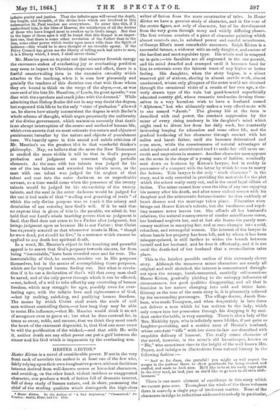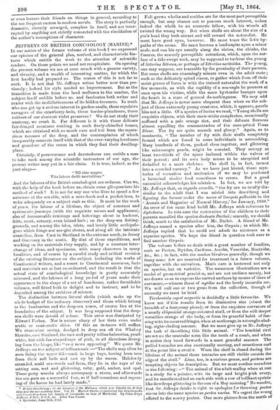HESTER KIRTON.* Hester Kirton is a novel of considerable power.
If not in the very front rank of novelists the author is at least one of the few who, fairly relying upon their own imaginative power, without factitious interest derived from well-known scenes or historical characters, and avoiding, on the other hand, violent incident or exaggerated character, can produce a work of fiction full of dramatic interest, full of deep study of human nature, and, in short, possessing the chief of the sterling qualities which distinguish the high-class
Hester Kirfon. By the Author of "A Bad Beginning," "Cheaterford," &e. London: Smith, Elder, and Co. 1804. writer of fiction from the mere constructor of tales. In Hester
Kirton we have a genuine study of character, and in the case of the centre figure, not only of character, but of its development from the very germ through many and widely differing phases.
The first volume consists of a piece of character painting which
almost reminds one, in subdued power and careful minuteness, of George Eliot's most remarkable successes. Ralph Kirton is a successful farmer, a widower with an only daughter, and a miser of the hardest and most repulsive type. His whole soul is wrapped up in gain ;—bia faculties are all engrossed in the one pursuit, and his mind dwarfed and cramped until it becomes hard for him to entertain even the faintest trace of any higher or better feeling. His daughter, when the story begins, is a silent reserved girl of sixteen, sharing in almost servile work, almost uneducated, whose only glimpses of the outer world are obtained through the occasional visits of a cousin of her own age, a cle- verly drawn type of the vain but good-hearted superficially educated country girl, whose romantic tendencies develop them- selves in a very harmless wish to have a husband named " Alphonso," but who ultimately makes a very affectionate wife to one named "Jacob." The gloomy life at the farm is described with real power, the constant suppression by the miser of every rising tendency in his daughter's mind which might tend to divert her from her daily work, her constantly increasing longing for education and some other life, and the gradual hardening of her character through contact with her sullen and harsh father, until she becomes determined and even stern, while the consciousness of natural advantages of mind neglected and uncultivated tend to make her still more un- couth and ungracious in manner. Another character soon appears
on the scene in the shape of a young man of fashion, nominally sent down on business by Kirton's lawyer, but in reality in pursuance of a compact with the latter by which he was to marry the heiress. Tuis lawyer is the only '" stock character" in the story, and is only essential in providing the materials for the plot which the others really carry out, and is the usual legal villain of fiction. The miser cannot bear even the idea of any one enjoying his money after his death, and after some violent scenes with his daughter and the aristocratic fortune-hunter he dies suddenly of heart disease and the marriage takes place. Education soon brings out Hester Kirton's talents, but the harshness and repel- ling manner never leaves her. She offends all her husband's relatives, the natural consequences of similar mesallianees ensue, her husband neglects her, and at last she learns his purely mer-
cenary motives in marrying her, and at once changes into a cold, relentless, and revengeful woman. The interest of the lawyer in
whose hands her property has been left, and by whom it has been misappropriated, is still further to widen the breach between herself and her husband, and he does it effectually, and it is not until the death-bed of her husband that a reconciliation takes place.
This is the briefest possible outline of this extremely clever story. Although the numerous minor characters are nearly all
original and well sketched, the interest is concentrated through- out upon the strange, harsh-mannered, morbidly self-conscious Hester Kirton, gradually yielding to the unhappy influences of circumstances, her good qualities disappearing, and all that is feminine in her nature changing into cold and bitter hate. Gloomy as the tone of the main story is, it is pleasantly relieved by the surrounding personages. The village doctor, Jacob Bon- ham, who reads Tennyson, and when desperately in love dares not deliver a note which he has written to the lady, which only comes into her possession through his dropping it by acci- dent under the table, is very amusing. There is also a lady of the Mrs. Nickleby type, who is infinitely more lifelike, if not quite so laughter-provoking, and a maiden aunt of Hester's husband, whose constant " tiffs " with her sister-in-law are described with exquisite delicacy of humour. The really comic character of the novel, however, is the miser's old housekeeper, known as "Biz," who sometimes rises to the height of the well known Mrs.
Poyser, and indulges in illustrations from natural history in the following fashion :—
" And as for Jane, she grateful ! you might as well expect the conger in the parlour there to show gratitoode for being cleaned, and stuffed, and made to look nice. He'd like to be at his nasty ways agent in the river mud, he 'ood, just as she'd like to go back to all she's shift- lessness.'"
There is one more element of excellence in this story which we cannot pass over. Throughout the whole of the three volumes
there is scarcely a single page of irrelevant matter. None of they,. characters indulge in reflections addressed to nobody in particular,
or even lecture their friends on things in general, according to the too frequent custom in modern novels. The story is perfectly dramatic, cleverly arranged, complete in itself, and not inter- rupted by anything not strictly connected with the elucidation of the author's conceptions of character.































 Previous page
Previous page